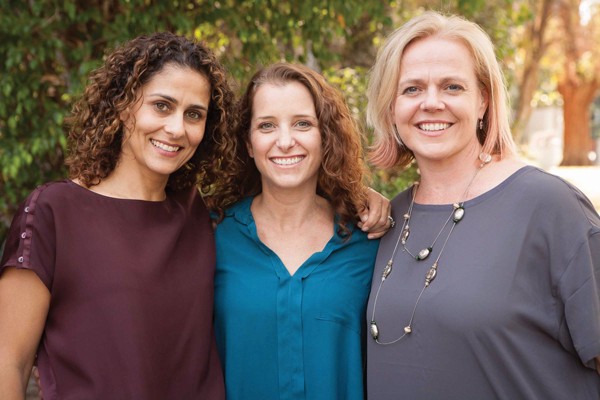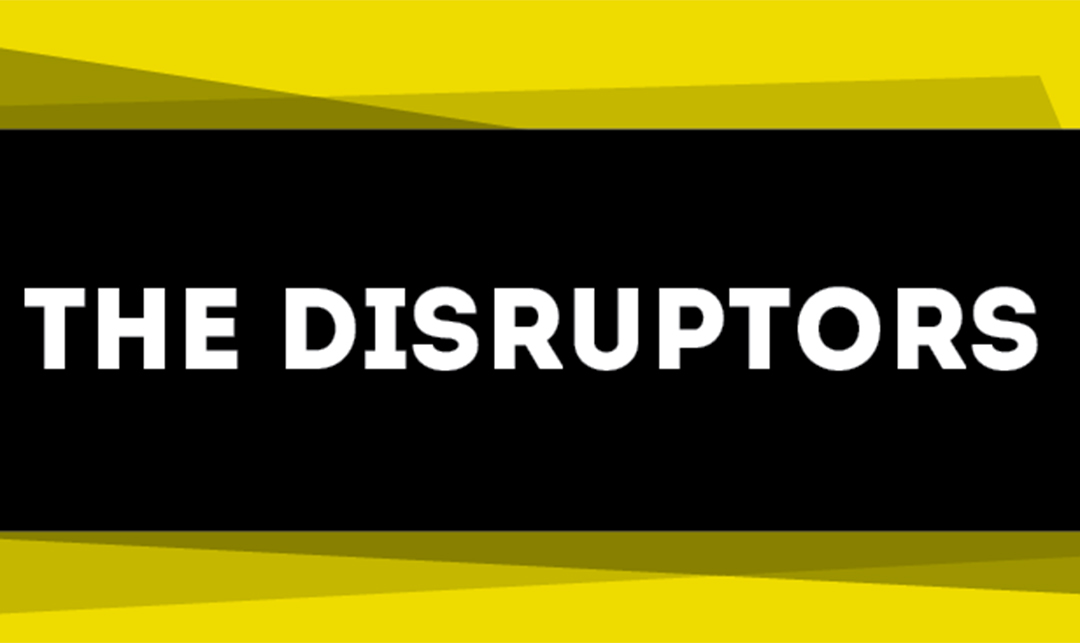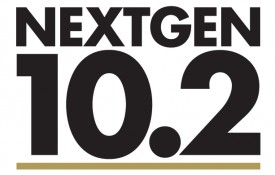HopSkipDrive
[Transportation] Uber-convenient for parents who carpool
Funds Raised $3.9M*
Modern American families share the need for evolved childcare. Working mothers Janelle McGlothlin, Carolyn Yashari Becher, and Joanna McFarland found a solution with the 2014 founding of HopSkipDrive mobile childcare concept to safely and reliably transport their eight children around the greater Los Angeles area.
“It was a marathon, not a sprint,” said McFarland, who worked as an investment banker before spending 10 years working in the Los Angeles tech space. “I’ve had a lot of experience building teams and launching products, but doing it from scratch is different.”

Carolyn Yashari Becher, Joanna McFarland, Janelle McGlothlin
The platform officially launched in March of 2015 and has attracted $3.9M in funding to date. Growth was slow and steady as co-founders focused on connecting with quality advisors, many who became future investors. McFarland said that she sought out investors who understand that small scaling protects quality of service.
Safety comes first for the “caregivers on wheels” business that staffed with more than 300 professional, certified drivers working under constant driving surveillance. All rides are reserved in advance and can be paid for a la carte or as part of a package. Every reservation includes a driver profile and photo, real-time mobile alerts, and the ability to track a child’s location via company app.
Employees > 35
Drivers > 350
Investors 6
hopskipdrive.com
Jukin Media
[Entertainment] The Fine Art of Ouch
Funds Raised $4.2M*
“An ouch is ouch in any language.” This pithy truism is at the heart of Jukin Media CEO and Founder Jonathan Skogmo’s success. Skogmo entered the entertainment industry in 2005 as a researcher on a clip show, sorting through VHS submissions in the mail bin. That same year, YouTube went live, and Skogmo quickly realized he could source incredible videos online much easier and cheaper than by sorting through the mail.
After a stint as a producer for various clip shows, he founded Jukin Media in 2009 and has gone on to disrupt the digital media industry with his unparalleled library of viral video content, a kind of “Getty Images for viral videos.”

Jonathan Skogmo
There’s more than just the monetization from selling or licensing rights for an individual clip – Jukin also packages those clips into longer form programming for everything from Jukin’s own FailArmy and JukinVideo sites, to segments on CNN and the Today Show. “These are organic, 100-percent-authentic, lightning-in-the-bottle moments, and they cost nothing to produce because they’re user generated,” says Skogmo. But perhaps the real secret sauce is that viral content often knows no borders. “A cute kid is a cute kid, a cute pet is a cute pet, a fail is a fail – anywhere in the world.”
Jukin’s success, with the valued assistance of President and COO Lee Essner, has allowed Skogmo to be extra discerning when it comes to raising capital. They have raised $4.2M from several investors in five rounds. “We’ve only taken money on terms that were really extraordinarily good for us; best of all we haven’t touched any investor capital because the company is profitable and self-sustaining.”
Employees 120
Investors 11
jukinmedia.com
SnackNation
[Business Services] Whetting an Appetite for Success
Funds Raised $5M*
By bringing healthy, emerging, and innovative snacks directly to consumers at their workplace, SnackNation is revolutionizing the $2 trillion consumer packaged goods industry. CEO and Co-founder Sean Kelly has long been inspired to find ways to give consumers access to healthy food, first with Fit Fuel, his healthy food vending machine venture, and then with H.U.M.A.N. (Helping Unite Mankind And Nutrition) which explores a micro market concept – basically a mini self-service Whole Foods inside an office break room.
“Democratization is incredibly important to us. We bring natural, organic, free-of-chemical brands directly to people who have never experienced them before.”
Founded in 2013 by Kelly and Andy Mackensen, SnackNation is neither a vending machine, nor a micro market service. It is a direct delivery and membership service for small businesses. SnackNation delivers a box of healthy snack options monthly, many of which are new and not yet available in grocery stores. “Democratization is incredibly important to us,” says Kelly. “We bring natural, organic, free-of-chemical brands directly to people who have never experienced them before.”

Sean Kelly, holding box, with SnackNation team
But to Kelly, it’s about more than snacks. “We want to help create an atmosphere where the employees are happy and loyal and produce good work.” That goal has paid off. SnackNation has been able to operate off its own cash, only bringing a significant angel round in 2014 to assist with growth. And they’ve paid it forward: SnackNation donates ten meals through Feeding America for every box sold.
*Visit SnackNation.com/CSQ for a free SnackNation sample box for your office!
Employees 60
Investors Undisclosed
snacknation.com/csq; awesomeoffice.org
Heal
[Health Care] Treating the Cause at the Source
Funds Raised $7.5M*
“Healthcare is a $3 trillion industry, yet most people hate the experience of going to the doctor’s office,” observes Heal CEO and co-founder Nick Desai. In 2014 Desai and his wife and cofounder Dr. Renee Dua set out to change that. “Our goal is to make seeing a doctor as easy as ordering a pizza.” Heal allows California residents to have a doctor come to them for non-emergency visits for a flat rate of $99 (or through their insurance), all with the click of a button.

Nick Desai, his wife Dr. Renee Dua, and their son
House calls may seem like a thing of the past, but Desai points out that in-home healthcare has many benefits: patients are relaxed, doctors aren’t rushed, and the doctor can see a patient’s home environment, lifestyle, and stress level, and make recommendations to improve overall health. This prevents health problems down the line, reducing costs and leading to a healthier population. Meanwhile, doctors benefit in that they are able to choose their own schedules, utilize state-of-the-art mobile healthcare technology, and work with happier patients.
Desai has been a serial entrepreneur since 1997; Heal is his fourth startup. But this is one he is most personally passionate about. “We want to change healthcare. Sixty percent of all healthcare costs go to overhead, facilities, or waste,” he points out. “We have no facilities, our overhead is minimal, and we’re using intelligent software to make sure people have appointments when they need them.”
Investors have taken note.
Employees 12
Doctors on Staff 150
Investors 50
getheal.com
HONK
[Transportation] Roadside Persistence in a Pinch
Funds Raised $14M*
Embracing the automotive mobile space in January of 2014, Corey Brundage developed HONK, an on-demand tow and roadside assistance mobile platform. The venture is his fifth startup and first significant experience with big funding, totaling about $1.25M in year one and $14M in fundraising to date.
“Young people today don’t really seek out AAA,” said Brundage, who found it a challenge to secure quality roadside assistance and realized that there was a larger issue at hand. “If Uber is the app that one uses if they don’t have a car, Honk is the app you use if you do.”
HONK disrupts the industry with membership-free, nationwide service around the clock. A la carte services cost almost half the amount of those offered by established competition. Further, the company’s 36,000 trucks rarely exceed a 25-minute arrival time, and professional contracted workers are paid almost double that of other companies.

Corey Brundage
The founder’s sustainable business methodology focuses on incremental goals and reverse engineering. By first defining the customer and how to acquire them in a repeatable way, he believes that entrepreneurs can attract investors based on proven small achievements versus empty promises.
“I always had this philosophy…I don’t just work for anybody. What am I going to learn from you? And I wouldn’t work at a company if I didn’t believe that there was something for me to grow as a person on my own journey.”
Employees 40
Investors 16
honkforhelp.com
TaskUs
Total Raised $15M
[Business Services]
Resourceful Outsourcing
When TaskUs entered the outsourcing industry in 2008, they initially sought to serve individual businesspeople by connecting them with virtual personal assistants. But CEO and founder Bryce Maddock and co-founder Jaspar Weir discovered that where they could really make an impact was by serving startup companies, not individuals.
“We had a lot of friends who had 10 or 20 employees in New York, San Francisco, and Los Angeles, but their growth rate predicted that they’d need 200 or 300 in a year to come and that was really daunting and very expensive,” says Maddock. “So we offered these companies a way to scale without breaking the bank, without having to raise so much capital in order to grow their company in such expensive locations.”

Bryce Maddock, Jaspar Weir
Profitability was good enough that they didn’t raise money until June of 2015 when they decided to expand their facilities in the Philippines to better accommodate their 5,000-employee workforce. Navegar, an investor with experience in the Philippines, invested $15M, and TaskUs plans to expand and open operations in Central America soon to broaden their geographic footprint. But their ultimate goal is to be a kind of “Uber for office workers,” envisioning a future where people are empowered to work anytime, anywhere, on their own terms, and still put out quality results.
In December TaskUs added Australian lending company Nimble to its stable of clients, reflecting its commitment to serving the growing number of startup companies in pockets around the globe. Other well-known brands that TaskUs serves include Tinder, Groupon, Whisper, and Hotel Tonight.
Employees 40 employees in the U.S.; 5,000 globally
Clients > 100
Investors 1
Projected 2015 Revenue $50M
taskus.com
HomeHero
Funds Raised $23M*
[Health Care] Taking Compassionate Care to the Next Level
Anyone who has ever cared for an elderly parent or grandparent knows it is a full-time job – and not always one everyone is equipped to handle. Caregivers sometimes live far from their charges, have busy schedules, and have children of their own to care for. Hired help is necessary, but finding reliable, trustworthy caregivers can be a monumental task. HomeHero founder and CEO Kyle Hill saw his own father go through it and was inspired to action. He and cofounder Mike Townsend set aside work on their startup, Flowtab, and, in 2013, launched HomeHero.

Kyle Hill (back row, L) and Mike Townsend (back row, R)
“The home care industry is highly fragmented,” Hill explains. “Caregivers were being assigned to families without much matching process. We focus on three aspects: quality, speed/ease of use, and price/affordability.” HomeHero utilizes an in-depth questionnaire, a phone interview, and an in-person interview to match caregivers with families. They use technology for caregivers to ‘clock in’ so that family members can be sure they are on site when they’re supposed to be. And caregivers benefit by getting paid faster, having increased job flexibility, and receiving higher wages for their work, which all leads to better quality care.
“We focus on three aspects: quality, speed/ease of use, and price/affordability.”
And quality is key: HomeHero spent six months in research and beta testing before launching publicly in January of 2014. They have received $3M in seed investments, and another $20M in their series A round from a total of five investors. Hill credits investor Mike Jones from Science (previously an advisor for Flowtab) with planting the seed that he should make HomeHero a reality. In less than two years, HomeHero has become the leading home care company in the country, providing over a million hours of care to seniors in California.
Employees 28
Caregivers 1,200
Investors 5
homehero.org
Thrive Market
[Nutrition] Consuming With a Conscience
Funds Raised $38M*
Investing in “goodness” and value-aligned influencers posed Thrive Market to become a 300-employee operation with $38M in funding. Co-founders Gunnar Lovelace and Nick Green launched the online health food retailer in November of 2014 and reached $80M in revenue during the first year – but the true impetus was social change.
“We see health and wellness as a lifestyle movement,” says Lovelace, a self-proclaimed serial entrepreneur who is most inspired by brands such as Patagonia that invest in social values. “People are voting with their dollars, and they want to support companies that they feel represent their values.”
“I’m a firm believer in business as a vehicle for social change…”
Brand and e-commerce experts Sasha Siddhartha and Kate Mulling later joined the operation that offers subscribers doorstep delivery of over 2,500 high-quality foods, vitamins, home goods, and beauty supplies up to half off retail price. For every paid member subscription, one low-income family receives a complimentary lifelong membership.

Gunnar Lovelace
Value-aligned investors were also natural marketing sources, connecting millions of initial subscribers to the platform. Institutional capital followed, and now the business stands ready to scale and innovate the supply chain by empowering the brands it represents to move toward more eco-friendly operations.
“I’m a firm believer in business as a vehicle for social change,” says Lovelace, who describes his brand as a 21st-century digital food co-op. “Hyper-scalable businesses committed to social values and building social enterprises are really critical to society,” adds Lovelace. “We are at this amazing moment where we need to remake our food supply chain and help people understand the importance of living a healthy life – and also make it easier, more affordable, and more convenient.”
Employees 300
Investors 200
thrivemarket.com
Ring
[Home Security] No More Mystery House Calls
Funds Raised $39.5M*
“It was the best of times, it was the worst of times,” reflects Jamie Siminoff on his 2013 Shark Tank appearance. He didn’t secure funding on the show but went on to develop his concept into Ring, a wireless doorbell home security monitoring system that has raised $39.5M to date.

Jamie Siminoff
Originally launched as DoorBot off a crowdfunding website in 2012, Siminoff thought up the idea while working on different projects in his garage. He was unable to hear the front doorbell, so he invented his own solution and prototype in December of 2012. After surviving four subsequent funding falls, he officially launched the technology among competitors Apple and Samsung in October of 2014.
Now four years into a 10-year plan to reduce crime in the community, Ring continues to capture its global target market of one billion homes. With partner-centric investors like Virgin Group founder Richard Branson, the system is primed for long-term expansion.

The RING product, offered in multiple color schemes
“We’re competing with the consumer’s perception of what a consumer electronics product needs to be,” said Siminoff, who favors quality partners over high equity. “I think that for me, Richard is the most interesting investor in terms of the world of entrepreneurship and achievement.”
Employees 180
Investors 8
ring.com
DogVacay
[Pet Care] Ahead of the Pack
Funds Raised $47M*
The toughest part of being a dog lover is being apart from your pooch – especially when you don’t have an easy answer to who is going to look after them while you travel. After seeing his dog emotionally shattered (and his wallet significantly lightened) by a stay at a kennel, Aaron Hirschhorn and his wife, Karine Nissim, decided to put his business school and venture capital background to use to find a better solution. The result, DogVacay, launched in 2012. Described by TechCrunch as “Airbnb for dogs,” DogVacay is an online service that helps connect pet owners to loving pet sitters across the United States and Canada.

Aaron Hirschhorn
“There are 83 million dogs in the U.S. – more than there are children – but no easy, reliable, trustworthy solution to the problem of how to find care for them when you wish to travel or need to be away,” Hirschhorn explains. “The pet services industry [excluding veterinarians] is a $15 billion industry, but is highly fragmented.” DogVacay works to bring those fragments together and take the stress out of finding that perfect dog sitter, adding peace of mind to vacationing owners by including daily photos of their pet, and covering each reservation with premium pet insurance.
“There are 83 million dogs in the U.S. – more than there are children – but no easy, reliable, trustworthy solution to the problem of how to find care for them when you wish to travel or need to be away,”
Investors were quick to see the value in the service and DogVacay received an initial $100,000 investment from Science and Mike Jones. After launching their official website they were approached by First Round Capital, bringing their seed money up to $1M. Benchmark led their series A, adding Bill Gurley to the board. Currently their funding clocks in at $47M with approximately 19 investors. DogVacay serves 3,000 cities nationwide and is expanding their services to fully cover walking, daycare, training, and other animals like cats.
Employees > 100 & 40+ office dogs
Dog Sitters > 20,000
Investors 19
dogvacay.com
Dollar Shave Club
[Personal Care] Sharper Than the Competition
Funds Raised $163.5M*
When a media leader leaves his industry to launch a new venture, there must be just cause. For Michael Dubin, CEO and founder of Dollar Shave Club, it was a simple lack of affordable, quality razors on the market.

Michael Dubin
“I set out to offer guys a better alternative than having to spend time going to the local drugstore where razors are locked behind a cabinet only to pay a ridiculous price,” says Dubin, who grew his career from writer and producer at NBC and MSNBC to New York digital content marketing strategist for brands like Gatorade and Reebok.
“We always start with a truth,” says Dubin. “For example, getting into the locked razor case at the store is an inconvenient experience. That’s true, right? Then we take that truth and stretch it to the absurd. This type of relatable humor we’ve developed has been translated across our brand on everything from our videos to our monthly box packaging.”
The Venice-based e-commerce company offers three tiers of high-quality stainless steel men’s razor blades and other personal grooming products, delivered directly to customer doorsteps each month. The brand sets itself apart from online subscription-based competitors by its seamless delivery service and club membership that includes access to exclusive products as a lifestyle experience.
The concept has been so successful that, according to company stats, the percentage of men who change razor blades weekly since signing up for the service increased from 28 to 66 percent. Through research and feedback from 2.4 million members, the brand engages its members by creating products that address their specific needs and educate them on how to use them.
“We always start with a truth … then we take that truth and stretch it to the absurd. This type of relatable humor we’ve developed has been translated across our brand…”
“You can get razors a lot of places on the Internet, but no one forms a better union of life-altering benefits – value, convenience, and fun – the way Dollar Shave Club does,” says Dubin.
Dubin launched the venture with co-founder Mark Levine out of his apartment in July of 2011. Solely funded by Dubin’s life savings, the venture first moved through proof and concept phases. Three months later the brand was prepared to target select investors who together have invested $148M since the 2012 launch.
Inspired by Apple and Nike, Dollar Shave Club has plans for future expansion. The brand’s signature marketing approach carries a humorous vibe that transforms inconvenient, real-life experiences into absurd situations, as seen in its famously popular YouTube ads.

Dubin stars in Dollar Shave Club’s videos, the majority of which go viral
“We’ve developed a unique brand voice that resonates with men and helps develop a community among our members. Part of this is creating a meaningful impact on our members’ lives.”
Employees 160
Projected 2015 Revenue > $150M
Investors Undisclosed
dollarshaveclub.com
* As of December 15, 2015











































